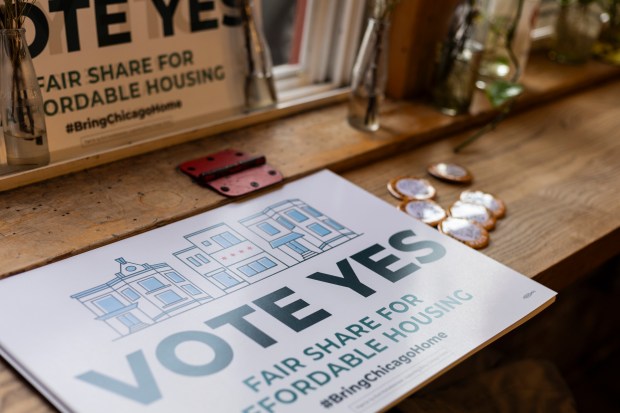In a victory for advocates for the homeless and Mayor Brandon Johnson, a state appellate court Wednesday ruled the Bring Chicago Home referendum question is valid with less than two weeks until the March 19 primary.
The ruling means votes on the referendum question will be counted, though it is possible the real estate and business coalition that fought the suit could appeal to the state Supreme Court.
In a decision Wednesday afternoon, Presiding Justice Raymond W. Mitchell wrote that the circuit court erred in its decision to invalidate the question. The appellate court vacated the judgement and instructed the circuit court to “dismiss the complaint for want of jurisdiction.” Justices Freddrenna M. Lyle and David R. Navarro agreed.
In short, they said Illinois courts have declined to exercise jurisdiction over matters that are a step in the legislative process and not fully enacted. “The holding of an election for the purpose of passing a referendum to empower a municipality to adopt an ordinance is a step in the legislative process of the enactment of that ordinance. Courts do not, and cannot, interfere with the legislative process,” Wednesday’s ruling said.
The complaint from business groups is “premature,” the ruling continued, and the circuit court “committed an abuse of discretion” when it didn’t allow Johnson’s administration to intervene in court.
The fate of the referendum asking voters whether to change the structure of the city’s real estate transfer tax has been in flux since January. That’s when a coalition of real estate groups led by the Building Owners and Managers Association filed a lawsuit against the Chicago Board of Elections in circuit court, arguing the question violated the state constitution and municipal codes and should be removed from ballots.
On February 23, Circuit Court Judge Kathleen Burke found in BOMA’s favor and invalidated the question. She also denied an attempt from Mayor Brandon Johnson’s administration to intervene in the case and mandated that the board of elections “suppress the vote,” meaning while the question remained on ballots, they would not be counted or reported out.
It represented a defeat for Johnson – who quarterbacked a revised plan combining a tax cut for lower-value properties with a tax hike on sales above $1 million. It was also a setback for the coalition of advocates who had been pushing for a dedicated revenue source to address homelessness for several years. The City Council approved putting the referendum question on the ballot back in November with hopes that when fully implemented, the change would bring in an additional $100 million in revenue per year.
Despite the uncertainty the court case wrought, the “Yes” coalition continued campaigning in the runup to primary day and decried the legal challenge as right-wing voter suppression. Both the city and board of elections appealed and the Bring Chicago Home coalition filed a brief in support of those appeals.
Aside from arguing against what they say is the faulty phrasing of the referendum question, real estate interests say they are fighting for the city’s economic future: that the increase on taxes would endanger an already fragile business recovery by pushing more costs onto commercial stakeholders. Opponents similarly painted the administration’s plans for the revenue as vague and suggested the city could not be trusted with a “blank check.”
If voters approved the referendum, the Chicago City Council would then officially vote to change the city’s current flat, 0.75% tax charged on the price of a property sale. Properties purchased at less than $1 million would see their rate cut to 0.6%. Properties purchased between $1 million and $1.5 million would have a 0.6% tax on the first $999,999 of the sale price and 2% on the rest. Sales above $1.5 million would pay 0.6% on the first $999,999, 2% on the next $500,000, and 3% on the rest.
The rate hike would hit few homeowners, but would more drastically impact commercial sales.
The 29-story office building at 230 W. Monroe that sold for $45 million in September, for example, would face a $1.3 million bill under the new structure, compared to $337,500 under the current rate. A $500,000 home, by contrast, would get a break on its bill, paying $3,000 instead of $3,750.
The three-part question combining an increase and decrease was part of the basis for the lawsuit. BOMA’s attorneys, Mike Kasper and Michael Del Galdo, argued it was an example of logrolling: putting a popular proposal in with an unpopular one to garner voter support.
In its appeal, the city argued the prohibition on “logrolling” applies only to state legislation, not city ordinances. Regardless, there was no logrolling to begin with, since the “matters that are closely related to each other,” and that the city was not prohibited from asking voters about a tax cut.
The city similarly argued that the circuit court improperly shut them out of proceedings even though it had an “obvious and substantial” interest in the outcome. “It is, after all, the City Council’s resolution that put the referendum on the ballot…. As long as the judgment is in place, the City is hamstrung and cannot proceed with the proposed ordinance to amend the transfer tax.”
The board of elections, meanwhile, argued throughout that they should not be party to the suit at all. The board “has a nondiscretionary, ministerial duty to comply with the City Clerk’s ballot certification,” they wrote in one of their appeal filings. “The Board has a long history of taking neutral positions on referenda initiated by ordinance or resolution through the City Council.”
Opponents argued the city could pass another resolution. When asked in February whether they might try again in November if they fail in courts, neither Mayor Brandon Johnson nor Bring Chicago Home advocates would answer directly.
aquig@chicagotribune.com



